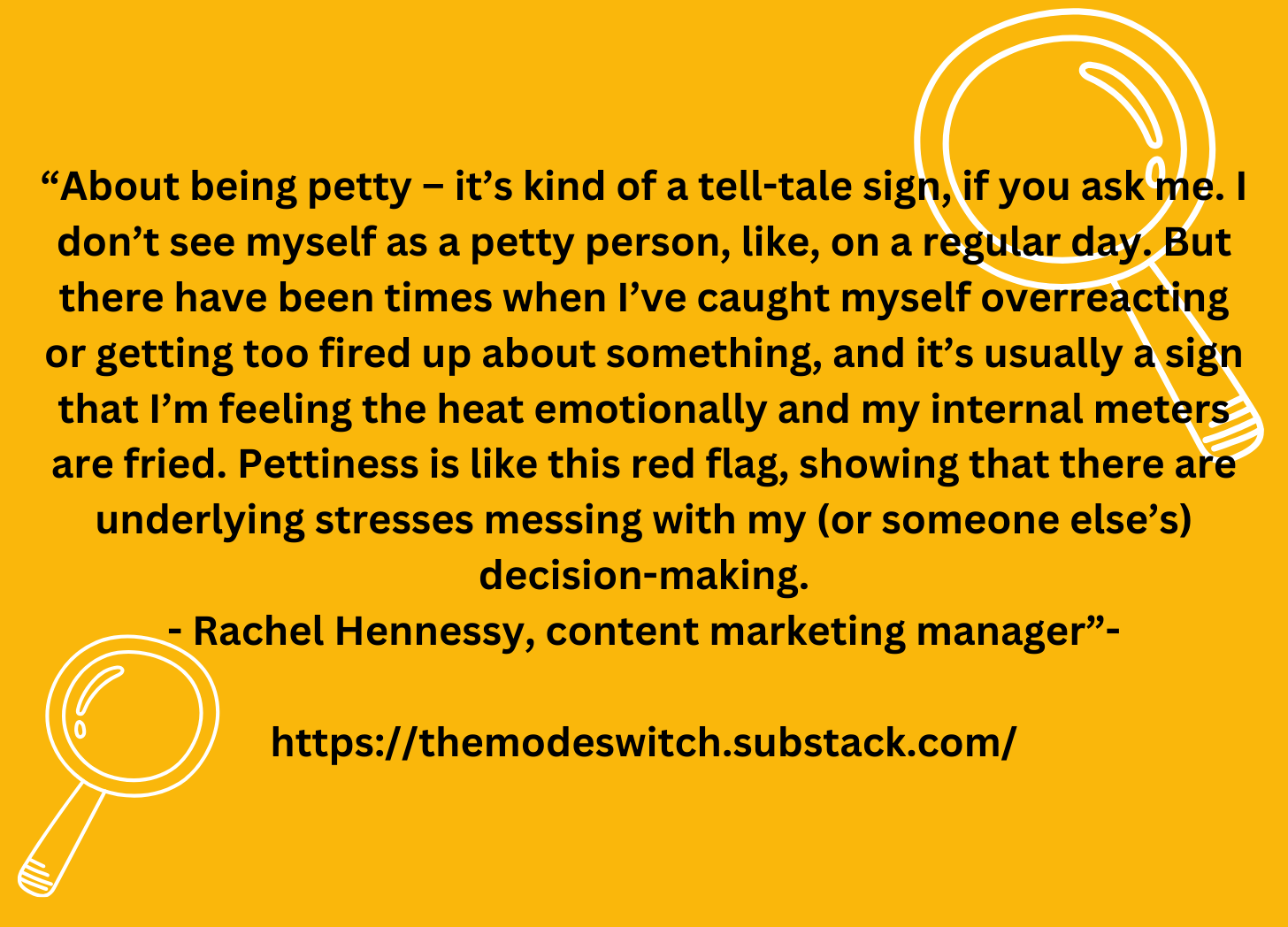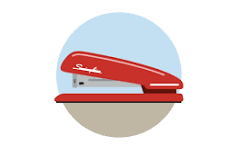Let’s talk about small-mindedness in work culture. Maybe most days, petty professionals are just sweating small stuff and talking trash. But sometimes, touchiness—or tetchiness, to use any older word—has things to teach.
Pettiness is widespread today, often for negative reasons. Pundits note its inadequate substitution for justice. Social scientists discuss what it signals when you give a tip for $4.03 tip instead of $4.00 even. (Let’s call it hyper-cents-itivity.)
But in the last decade, pettiness has taken popular culture by storm as a positive emotion, thanks to queer “petty era” discourse, Black twitter, and Taylor Swift.
In our workplaces, too, pettiness alert us to the significance of small things.
When Pettiness Shows Up
The thing about sensitivity to small things is, it almost always takes us unaware. Here’s a quick childhood story about a time peevishness surprised me.
When I was in fifth grade, I got picked up from school by a neighbor named Mrs. Downs. I often sat behind her driver’s seat, a skinny ten-year-old, holding my metal lunchbox, and jiggling my feet. One day, the neighbor flicked her cigarette out the window and burst out, “Craig, will you STOP bouncing your feet under my seat?”
I stared at the back of her head, my eyes wide. How had she known what my toes were doing? Finally, I said in a small voice, “You’re very sensitive, Mrs. Downs.”
If Mrs. Downs had been peeved by my feet, she was furious at my words. She let me know, in no uncertain terms, that she was not sensitive. My bouncing feet were objectively rude and decidedly obnoxious.
But here’s the thing. I had meant my sentence with a ten-year-old’s literalness, expressing surprise at her buttock sensitivities. I might just as easily have said, “You have very sharp eyesight, Mrs. Downs.”
When you discover something annoys another human, it’s a signal. Okaaaaaay, I seem to experience the world differently than you do.
What Pettiness Teaches
When someone else is tetchy at work, it can show where you could do with a little more tetchiness as well.
Years ago, I worked for a nonprofit organization that did a regular cycle of evaluations with clients. I’ll never forget the two evaluators who, in the space of a year, accused me of sexism. “He talks over his women colleagues,” they noted in words to that effect.
Those evaluations, from two different working groups, stung me like lemon juice in a paper cut. I had considered myself a good listener and a gender-inclusive coworker. But some of our clients thought I was neither.
Were they just being overly sensitive? But then, I started remembering work sessions when I had been too eager to grab the white-board marker, too quick to talk, too slow to listen. The more the memories poured in, the more I wished I’d been more sensitive to my women colleagues’ social cues.
Maybe if I’d been more thin-skinned, I wouldn’t have missed those social cues.
What Pettiness Costs
Hypersensitivity can provide needed signals. But it’s not without its costs. As Rachel Hennessy noted, “Some people just like drama, and some people are just naturally petty and want to be right.” In such cases, peevishness can be socially expensive.
Pettiness can create an unwanted reputation. If you sweat the small stuff, and you don’t have data to show why the small stuff matters—as Adam Frankenfeld, a corporate manager notes—your coworkers will build a story about you. “As soon as someone crosses the pettiness line, it's hard to change the narrative about that person/approach. ‘Oh that's Jim, he's always resistant to new ideas.’” Rosalia Portillo adds from her experience in corporate: “Don't say anything you aren't willing to have read by your boss.”
Pettiness decreases in value as power increases. When Taylor gets back at Kanye, pettiness feels good. But when it’s Elon Musk and Mark Zuckerberg mounting up for the “petty patrol,” irritability goes sour fast fast. Maybe we should think of pettiness as having a short shelf life. (Want to read more about power and pettiness? I benefited from this essay in Swaddle as I wrote this week’s Mode/Switch.)
Pettiness attempts an individualized approach to an organizational problem. Often, our companies have bigger problems than personal peevishness can solve. It’s okay for rising professionals to use pettiness as a social signal. It’s much better idea to cultivate workplace communities where trust, not spite, is the social currency.
What to Do about Pettiness
As you can see, throughout this post, I’m drawing on the wisdom of Mode/Switch readers who I asked for help on the subject of pettiness. They helped me to map out two different conditions of pettiness—personal problems and organizational problems—the intersection of which suggests a model for responding to pettiness in yourself and in others.
Find your valve. If someone’s being petty, and it’s merely a personal problem, they probably just need a release. Vent some sarcasm. Burst into tears. Laugh hysterically. Whatever the petty expression of choice, you can usually overlook and forgive someone who’s just having one of those days.
Find the door. But if you’re feeling petty, and it’s not just your problem, you may be sensing something rotten in the state of your company. The intersection of the personal and the organizational might indicate it’s time to find another job—especially, if you’re fused with your feelings and your company culture is fused with the problem.
Find your friends. Sometimes stuff’s not a big deal to you and not a big deal to the company, either. But complaining can actually be a way to build connection with other coworkers. Bethany Keeley-Jonker, a communication professor, notes that blowing off steam can build up community. Jokey bitching can clarify that, as irritating as all the things may be, the world just keeps coming to an end.
Find your voice. If pettiness sources to an organizational problem unrelated to you personally, you still might want to gripe anyway. Setting aside your usual suavity can be a way to advocate for your workplace’s wellbeing. When someone who’s usually put-together expresses irritation, the higher-ups tend to notice.
And if any of these four strategies fail to help you cope with pettiness, you can always try listening to this while you work…
A Final Word about What Small Things Can Say
Yesterday, I took a break from writing this post to attend an observance of Martin Luther King’s holiday. Every year, my university holds a January Series, two weeks of TED-Talk-like presentations from prominent artists, social critics, and other public figures. Yesterday, the series launched with Stanford scholar, Lerone Martin, who shared a little-known story about the only non-Presidential American to have a memorial on the Washington Mall.
Martin Luther King was 15 years old, riding back on a packed bus from a speech competition. He had lost the competition and was mulling over the defeat. The bus made a stop, and more people got on, standing in a clump at the front of the bus, looking for seats. The driver yelled at Martin to get up, and the teenager shook his head no. The driver yelled even louder, and, upon the urging of people around him, the young man, who would later go on to launch the Montgomery Bus boycott, stood and up gave his seat to a white person.
It’s a reminder not to miss the import of the seemingly miniscule.
-craig
Would you reply to this email with a story about your experience of workplace pettiness? Which of the four strategies above do you find yourself most often using? (Hopefully, not this one.)
What the M/S Team is up to these days ….
Gesturing: Mostly, as you can see from this pic, we like to talk with our hands.
Surveying: David Wilstermann and I need to hear from you. Take this five minute survey about what energizes (or enrages?) you at work.
Researching: I just submitted an essay to the Southern Journal of Communication on rising professionals and their attitudes towards work during the Great Resignation.
Designing: Grateful to Hannah Sherbrooke for her design work on this (her first) Mode/Switch Newsletter. Glad to have you on the team, Ms. Sherbrooke!
Carding: Emily Bosscher and I are designing workplace conversation playing cards. We just completed marketing research this week and are ready to make some product!
Podcasting: The Mode/Switch Pod starts back up this week. Join us on Friday, subscribing on Spotify.








